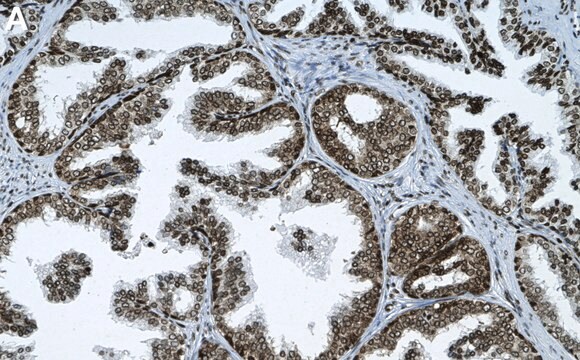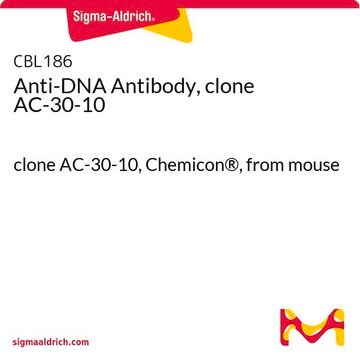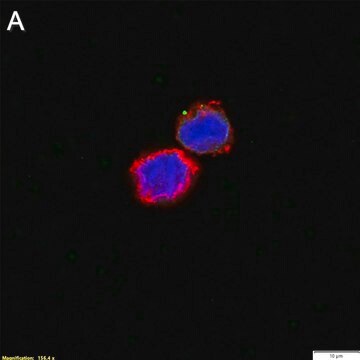MAB030
Anti-DNA Antibody, double stranded, clone BV16-13
culture supernatant, clone BV16-13, Chemicon®
Synonym(s):
Double-stranded DNA antibody
Sign Into View Organizational & Contract Pricing
All Photos(1)
About This Item
UNSPSC Code:
12352203
eCl@ss:
32160702
NACRES:
NA.41
Recommended Products
biological source
mouse
Quality Level
antibody form
culture supernatant
antibody product type
primary antibodies
clone
BV16-13, monoclonal
species reactivity (predicted by homology)
all
manufacturer/tradename
Chemicon®
technique(s)
ELISA: suitable
immunocytochemistry: suitable
radioimmunoassay: suitable
isotype
IgG2aκ
shipped in
wet ice
target post-translational modification
unmodified
Specificity
Double stranded DNA (dsDNyA) (B-form) from human. Shows 95% reactivity to dsDNA and 28% reactivity to ssDNA.
BINDING ASSAY:
Supernatant was incubated with 32P-end labeled heat-denatured (ss)DNA or duplex (ds)DNA restriction fragments (20 pmoles nucleotides; 16,000 cpm) followed by precipitation of anti-DNA/DNA complexes with excess rabbit anti-mouse and quantitation of bound [32P] DNA by Chernkov radiation.
ANTIGEN BINDING
PROFILE: Relative Binding To:
Natural DNA Synthetic homopolymers
dsDNA(a) ssDNA(b) poly(dA) poly(dC) poly(dG) poly(dT) poly(dI) poly(dU)
1.00 0.45 0.01 0.01 0.01 0.01 0.01 0.01
Nucleic acids were complexed with solid phase mBSA and incubated with anti-DNA antibody. Radioiodinated protein A binding at the highest antibody quantity tested (either 10 mg of purified antibody or a 1:2 culture supernatant dilution) was measured and normalized relative to that determined for the preferred antigen (given a value of 1.0).
a) Native calf thymus DNA b) Heat-denatured calf thymus DNA
BINDING ASSAY:
Supernatant was incubated with 32P-end labeled heat-denatured (ss)DNA or duplex (ds)DNA restriction fragments (20 pmoles nucleotides; 16,000 cpm) followed by precipitation of anti-DNA/DNA complexes with excess rabbit anti-mouse and quantitation of bound [32P] DNA by Chernkov radiation.
ANTIGEN BINDING
PROFILE: Relative Binding To:
Natural DNA Synthetic homopolymers
dsDNA(a) ssDNA(b) poly(dA) poly(dC) poly(dG) poly(dT) poly(dI) poly(dU)
1.00 0.45 0.01 0.01 0.01 0.01 0.01 0.01
Nucleic acids were complexed with solid phase mBSA and incubated with anti-DNA antibody. Radioiodinated protein A binding at the highest antibody quantity tested (either 10 mg of purified antibody or a 1:2 culture supernatant dilution) was measured and normalized relative to that determined for the preferred antigen (given a value of 1.0).
a) Native calf thymus DNA b) Heat-denatured calf thymus DNA
Immunogen
Epitope: double stranded, 28% reactive with single stranded
Application
Detect DNA with Anti-DNA Antibody, double stranded, clone BV16-13 (Mouse Monoclonal Antibody), that has been shown to work in ELISA, RIA, ICC.
EIA/RIA
Immunocytochemistry
Optimal working dilutions must be determined by end user.
Immunocytochemistry
Optimal working dilutions must be determined by end user.
Research Category
Epigenetics & Nuclear Function
Apoptosis & Cancer
Epigenetics & Nuclear Function
Apoptosis & Cancer
Research Sub Category
Cell Cycle, DNA Replication & Repair
Apoptosis - Additional
Cell Cycle, DNA Replication & Repair
Apoptosis - Additional
Physical form
Unpurified tissue culture supernatant from a perfusion system, filtered through a 0.2μ micron membrane prior to vialing. Product contains 20%FBS and Ciprofloxacin at final concentration of 10μg/mL.
Storage and Stability
Maintain at 2-8°C in undiluted aliquots for up to 6 months.
Legal Information
CHEMICON is a registered trademark of Merck KGaA, Darmstadt, Germany
Disclaimer
Unless otherwise stated in our catalog or other company documentation accompanying the product(s), our products are intended for research use only and are not to be used for any other purpose, which includes but is not limited to, unauthorized commercial uses, in vitro diagnostic uses, ex vivo or in vivo therapeutic uses or any type of consumption or application to humans or animals.
Not finding the right product?
Try our Product Selector Tool.
Storage Class Code
10 - Combustible liquids
WGK
WGK 1
Certificates of Analysis (COA)
Search for Certificates of Analysis (COA) by entering the products Lot/Batch Number. Lot and Batch Numbers can be found on a product’s label following the words ‘Lot’ or ‘Batch’.
Already Own This Product?
Find documentation for the products that you have recently purchased in the Document Library.
Petter Langlete et al.
Frontiers in microbiology, 10, 2708-2708 (2019-12-12)
Extracellular vesicles secreted by Gram-negative bacteria have proven to be important in bacterial defense, communication and host-pathogen relationships. They resemble smaller versions of the bacterial mother cell, with similar contents of proteins, LPS, DNA, and RNA. Vesicles can elicit a
Rajeeva Singh et al.
Molecular pharmaceutics, 17(1), 50-58 (2019-11-20)
DNA-targeting indolinobenzodiazepine dimer (IGN) payloads are used in several clinical-stage antibody-drug conjugates. IGN drugs alkylate DNA through the single imine moiety present in the dimer in contrast to the pyrrolobenzodiazepine dimer drugs, such as talirine and tesirine, which contain two
Sravani K Ramisetty et al.
International journal of biological macromolecules, 103, 845-853 (2017-05-26)
The macromolecules of the bacterial cell occupy 20-40% of the total cytosol volume, and crowded environments have long been known to compact and stabilize DNA. Nevertheless, investigations on DNA-protein binding are generally performed in the absence of crowding, which may
C A Cooke et al.
The Journal of cell biology, 120(5), 1083-1091 (1993-03-01)
The location of the cis-acting DNA sequences that direct the assembly of the mammalian kinetochore is not known. A variety of circumstantial evidence, however, has led to the widespread belief that they are present throughout the kinetochore including the kinetochore
Taeko Sasaki et al.
Scientific reports, 7(1), 11257-11257 (2017-09-14)
Mitochondrial DNA (mtDNA) is organized in nucleoprotein complexes called mitochondrial nucleoids (mt-nucleoids), which are critical units of mtDNA replication and transmission. In humans, several hundreds of mt-nucleoids exist in a cell. However, how numerous mt-nucleoids are maintained during the cell
Our team of scientists has experience in all areas of research including Life Science, Material Science, Chemical Synthesis, Chromatography, Analytical and many others.
Contact Technical Service








